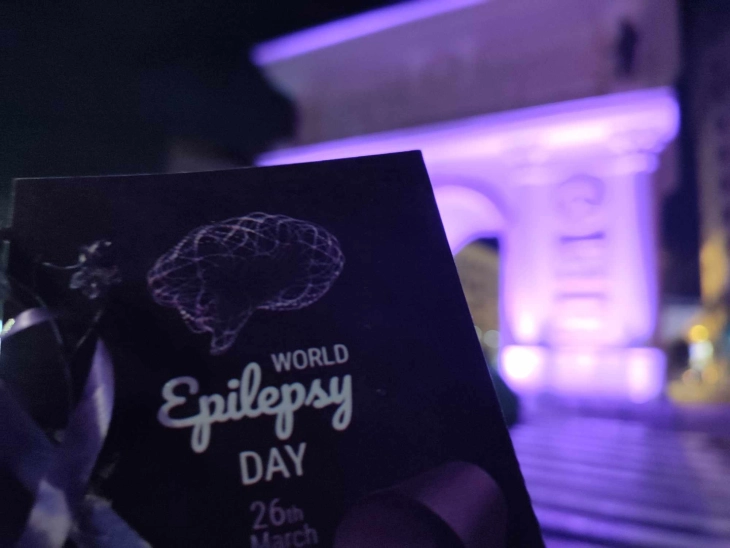"Porta Macedonia" lights up purple on Epilepsy Awareness Day
- "Porta Macedonia" triumphal arch shines in purple on Tuesday to mark March 26 - Purple Day in support of Epilepsy awareness worldwide.
- Post By Nevenka Nikolik
- 20:51, 26 March, 2024

Skopje, 26 March 2024 (MIA) – "Porta Macedonia" triumphal arch shines in purple on Tuesday to mark March 26 - Purple Day in support of Epilepsy awareness worldwide.
The Macedonian Neurological Association, the Macedonian League against Epilepsy and the University Clinic of Neurology observed Purple Day in downtown Skopje by handing out purple t-shirts and educational materials to raise the voice for people with epilepsy.

According to neurologist Sanja Dzhambazovska Zikova, epilepsy is a condition that people have been hiding for a long time.

"They have not been disclosing it to the public precisely because of the misconceptions that prevail about this condition, and so people had very little opportunity to get to know about it. However, even in the most developed countries, the stigma and isolation of these patients persists to this day, and it all comes down to ignorance and insufficient education," says Zikova.
Their goal and the reason for organizing such events, she added, is precisely to hand out educational materials and raise awareness about epilepsy.
Dean Buneski, president of the Association "Epilepsy Macedonia", said that since 2008, Purple Day has been observed in more than 100 countries throughout the world.

"People with epilepsy seek to raise awareness about this disorder, because the people themselves are too stigmatized and discriminated in some way in society. This can be confirmed by people with epilepsy and the lack of medications that can be used to treat them. Those are the two main problems they face," he said.
As regards the procurement of medications, he says that it is a global problem.
"The problem is global, at the world level, some of the main components and ingredients of antiepileptics are not available at the world level, consequently the pharmaceutical companies cannot produce the medications," Buneski added.
Buneski noted that most people with epilepsy achieve good seizure control with regular medications, and many people with epilepsy can conduct a normal life.

An estimated 50 million people worldwide have epilepsy, making it one of the most common neurological diseases globally.
The total number of epilepsy patients in the country is 13,824, i.e. the prevalence of epilepsy in the country is 6.67 per 1,000 inhabitants.
Photo: MIA







